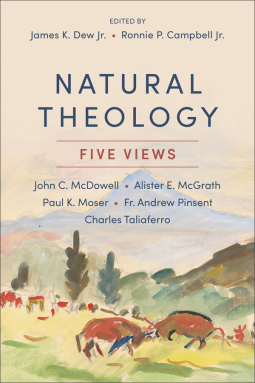
Natural Theology
Five Views
by James K. Dew Jr. and Ronnie P. Campbell Jr., eds.
This title was previously available on NetGalley and is now archived.
Send NetGalley books directly to your Kindle or Kindle app
1
To read on a Kindle or Kindle app, please add kindle@netgalley.com as an approved email address to receive files in your Amazon account. Click here for step-by-step instructions.
2
Also find your Kindle email address within your Amazon account, and enter it here.
Pub Date Apr 16 2024 | Archive Date Apr 29 2024
Baker Academic & Brazos Press | Baker Academic
Talking about this book? Use #NaturalTheology #NetGalley. More hashtag tips!
Description
The contributors offer constructive approaches from major perspectives--contemporary, Catholic, classical, deflationary, and Barthian--in a multiview format to provide readers with the "state of the question" on natural theology. Each unit consists of an introduction by a proponent of the view under discussion, responses from the other contributors, and a final response by the proponent. James Dew and Ronnie Campbell provide a helpful introduction and conclusion.
Offering a model of critical thinking and respectful dialogue, this volume provides a balanced, irenic approach to a topic of ongoing debate. Students of theology, Christian philosophers, and readers interested in the theology and science dialogue will value this work.
Advance Praise
“In this thought-provoking book, leading scholars from five distinct viewpoints come together to discuss key questions concerning natural theology. Through their engaging and insightful dialogue, this volume provides a comprehensive and balanced overview of the subject. It is a must-read for scholars and students of philosophy and theology as well as for anyone interested in exploring the relationship between faith and reason.”—Yujin Nagasawa, professor of philosophy and Kingfisher College Chair in Philosophy of Religion and Ethics, University of Oklahoma
“As we navigate our increasingly post-Christian world, few doctrines will prove as pivotal as natural theology for an effective and informed witness. We who were made ‘a little lower than the angels’ have received God’s material creation and our immaterial conscience as gifts to steward, but frequently we don’t know where to begin, much less how to integrate them into a theological and philosophical framework. The views represented in this work, and the collegiality with which its authors present them, will guide twenty-first-century Christians in their consideration of the often-overlooked doctrine of natural theology.”—Katie J. McCoy, director of women’s ministry, Texas Baptists
Available Editions
| EDITION | Other Format |
| ISBN | 9781540960443 |
| PRICE | $26.99 (USD) |
| PAGES | 304 |
Available on NetGalley
Featured Reviews
This books aims to capture five (5) current, and competing, viewpoints of natural theology, each championed by a different author. Almost immediately it becomes obvious that even defining what natural theology is always becomes part of the debate and it can seem like each proponent is spending at least some effort talking at cross purposes. In simple terms, it is basically the study of the creator by the study of the creations. The five views stake out positions that run from a maximal view that focuses on “proving” the existence of God and presuming an ultimate good through extension of man’s goodness to a complete rejection of any applicability for natural theology at all (quite a surprise actually). Each chapter begins with a basic premise statement describing the specific viewpoint, followed by a response by each of the other contributors critiquing that statements and ending with a final reply by the original author providing a followup counterpoint to the critiques. Amazingly enough, the exchange was actually very constructive and respectful, without what I have come to expect between scholars on opposing sides of an issue … which I appreciated greatly. In fact, I found it exceptionally helpful in understanding the specific strengths and weakness of each position … having a lot more familiarity with the classical and contemporary positions than the deflationary and Barthian position, it should probably not come as a surprise that I still favor the catholic viewpoint where natural theology augmented by grace can be used to know God, but there were strong arguments from the deflationary viewpoint that emphasized revaluation and experience that connected with some of my charismatic roots … and while I can understand the more calvinist viewpoint from Barth, I found the apparent rejection of natural theology there problematic and overly concerned with an error of naturalism/idolatry with an over reliance on scriptural revelation that for me, borders on fideism. That is not to say that I gained nothing from each point of view, because all of them had some excellent points that highlight the tension and struggle that is perhaps necessary for a healthy faith.



